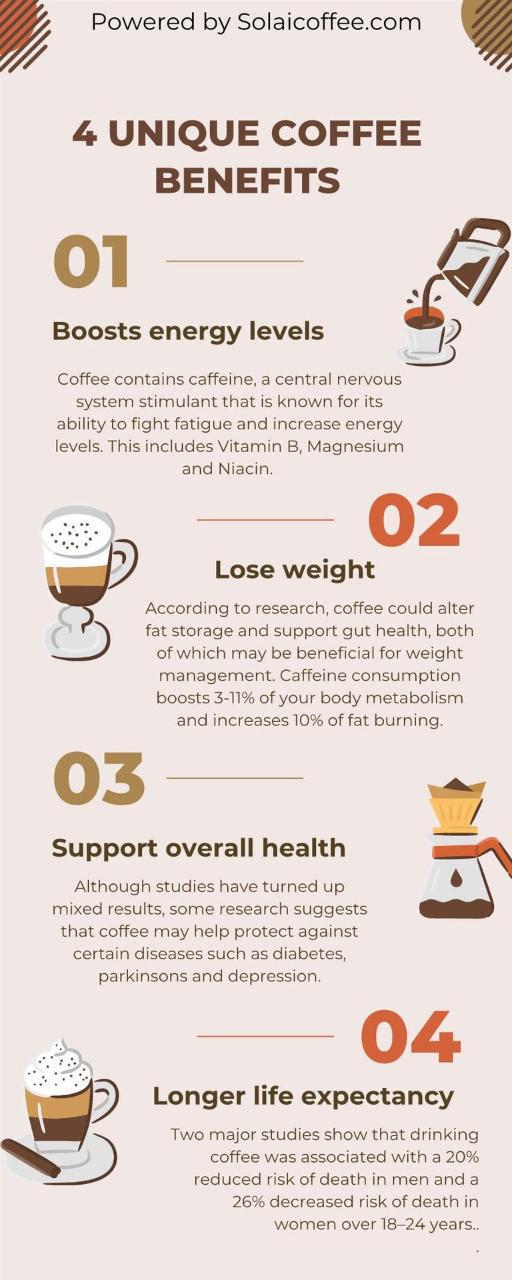Effects Of Coffee On Your Body
Coffee is a drink that is prepared from roasted coffee beans. Coffee contains caffeine with benefits and side effects, which experts have studied thoroughly.
According to Medical News Today, Caffeine is a stimulant and the most commonly used drug globally. Due to its herbal benefits, coffee is known to be a healthy drink option with many benefits to the body.
[Infographic]: Health Benefits of Coffee
Coffee consumption has the
potential to positively influence your overall health and offer various
advantages. Take a look at our coffee health benefits infographic for more details.

Effects of Drinking Too Much Coffee on Your Health
Coffee, with its invigorating aroma and rich taste, is a beloved beverage enjoyed by millions worldwide. While moderate coffee consumption can offer several health benefits, over-indulgence in this caffeinated delight can lead to adverse effects on your well-being.
Millions consume it daily to increase wakefulness, alleviate fatigue, and improve concentration and focus. Unfortunately, drinking too much coffee may result in side effects for your body.

Effects of drinking too much coffee.
- Anxiety and Nervousness
- Disrupted Sleep Patterns
- Dependency
- Calcium depletion
- Bone Health
- Increased heart rate
- High blood pressure.
1. Increased Anxiety and Nervousness
Excessive coffee consumption can lead to heightened anxiety and nervousness. The high caffeine content in coffee stimulates the release of stress hormones like cortisol and adrenaline, triggering a "fight or flight" response. This can cause feelings of restlessness, jitters, and even panic attacks in sensitive individuals.
2. Disrupted Sleep Patterns
Drinking too much coffee, especially later in the day, can disrupt your sleep patterns. The stimulating effects of caffeine can interfere with the body's natural sleep-wake cycle, making it difficult to fall asleep or stay asleep. Insomnia and sleep disturbances become more prevalent in those who consume excessive amounts of coffee regularly.
3. Dependency and Withdrawal
Regularly drinking large amounts of coffee can lead to caffeine dependency. When you consume coffee consistently, your body adjusts to the caffeine levels, leading to tolerance. If you suddenly reduce or stop coffee intake, you may experience withdrawal symptoms, such as headaches, fatigue, irritability, and difficulty concentrating.
4.Calcium Depletion and Bone Health
Caffeine can interfere with calcium absorption in the body, potentially leading to weakened bones over time. Inadequate calcium intake can increase the risk of osteoporosis and fractures, especially in postmenopausal women.
5. Increased Heart Rate and Blood Pressure
Over-consumption of coffee can lead to an increase in heart rate and blood pressure. Caffeine stimulates the nervous system, causing blood vessels to narrow and the heart to beat faster. Prolonged elevation of blood pressure can put strain on the cardiovascular system, potentially increasing the risk of hypertension and heart-related issues.
CONCLUSION
It's essential to be mindful of your coffee intake and consider limiting it to a moderate level, especially if you are sensitive to caffeine or have pre-existing health conditions. We recommend drinking quality coffee in moderation.
The FDA recommends that healthy adults limit their caffeine intake to 400 milligrams (mg) daily, about 4 or 5 cups of coffee. Remember, balance is key to enjoying the pleasures of coffee while safeguarding your health in the long run.
Never underestimate the power of a good cup of coffee.
One sip, that's it!

Effects Of Coffee On Your Body